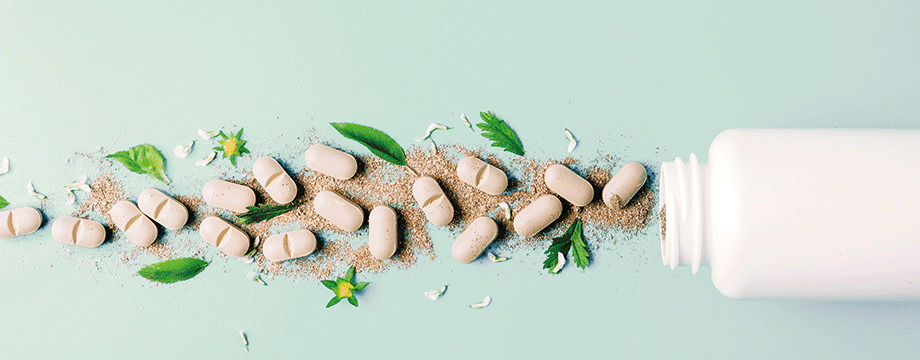Must-have supplements

Our experts give us the lowdown on the must-have vitamins, minerals and supplements that everyone should consider taking
Vitamin B
“You often find that B vitamins are depleted in individuals who suffer from anxiety and stress,” explains Jenny Tschiesche, nutritionist and founder of Lunchbox Doctor (www.lunchboxdoctor.com). “Algaes such as spirulina and chlorella provide a wide range of B vitamins. However, if you want to take a capsule form, I recommend taking a food-based vitamin that includes the full spectrum of B vitamins. B vitamins work together within the body to carry out functions and balance one another.”
Vitamin C
“Not only has vitamin C been shown to curtail colds, it can also speed up wound healing,” says Jenny. “As an antioxidant, it is responsible for getting rid of excessive free radicals that might otherwise do damage. In this capacity, vitamin C has a protective role. Including vitamin C in your diet is important. Many people simply do not eat sufficient quantities of fruit and vegetables (three to five vegetable portions and two to four fruit portions daily) which is where vitamin C is commonly found. Supplementing could, therefore, be extremely helpful for many.”
Vitamin E
“Getting enough vitamin E foods in your diet may aid in the treatment of certain skin conditions, boost hair growth and even support healthy vision,” says Jenny. “Vitamin E is a fat-soluble vitamin that acts as an antioxidant in the body. It is as an antioxidant that a vitamin E supplement could help protect against lifestyle-related disease.”
Magnesium
“When people think about key nutrients, magnesium is often overlooked,” says Michaella Mazzoni, a registered nutritional therapist who works in various clinics across Edinburgh and remotely via video (Michaellamazzoninutrition.com). “It is involved in almost every system of the body: muscle function, detoxification and the nervous system, to name a few. Signs of a magnesium deficiency include a quiver in the tongue and muscle cramps/spasms. Like all nutrients, there are dietary sources of magnesium such as dark leafy greens, legumes, nuts, seeds and wholegrains. However, as magnesium deficiency is quite common, supplementation is often suitable for a short period. In order to get the most from the supplement, selecting the right form of magnesium is important. Magnesium citrate is the easiest form to absorb and can have a laxative effect, making it useful for those with constipation, whereas magnesium oxide supports natural relaxation and magnesium citrate is great for supporting cardiovascular health. Magnesium supplementation is best done with a practitioner as it can interact with certain medications.”
Vitamin D
“Vitamin D is involved in immunity, hormone function, insulin sensitivity and mood,” explains Michaella. “Although available in the diet from foods such as oily fish, eggs and butter, we primarily rely on the sun as our primary source of vitamin D. Unfortunately, that means that during the months of November to March, people in the UK are typically not getting enough vitamin D. Vitamin D deficiencies are very common in the UK and have been linked to conditions like osteoporosis, type 2 diabetes and Seasonal Affective Disorder (SAD). In my clinic, I often see low levels of vitamin D in people with autoimmune conditions. Since low levels of vitamin D are so common in the UK, your GP should be happy to test this for you once a year. Vitamin D supplements are easily accessible in health food shops; opt for a spray form with vitamin K added to increase absorption.”
Omega-3
“Omega-3 is a fatty acid involved in anti-inflammatory pathways in the body,” explains Michaella. “It ‘competes’ with omega-6, which is pro-inflammatory. Although essential for health, excessive omega-6 has been linked with cardiovascular disease such as heart attacks and strokes. For that reason, omega-3-rich foods such as oily fish like salmon and sardines are an important part of a healthy diet. Signs of low omega-3 include body pains, dry and itchy skin, poor memory and concentration. When selecting an omega-3 supplement, the source is important. Opt for a supplement which has been made from a smaller fish like sardines, rather than cod liver; the larger the fish, the more time it has had to accumulate toxins during its lifespan and the liver is the part of the body which works through toxins. Vegan formulas are now readily available, too.”
Co-enzyme Q10
“Co-enzyme Q10 or coQ10 is a powerful antioxidant required in many areas of the body but especially so for heart health, cell health/ageing, energy levels and muscle health,” explains Michaella. “The body creates coQ10 naturally. However, the amount we produce declines with age and we don’t always make it consistently. Recent studies suggest that deficiencies of coQ10 are associated with some conditions like heart disease, diabetes and declined cognitive function. In our modern lives, we encounter free radicals daily; certain foods and food processing are examples. A big part of how coQ10 functions is fighting free radicals, so supplementation may be beneficial for those over 35 or those taking statins, which deplete coQ10 levels. Always check with your healthcare provider before starting any new supplementation.”
Did you know?
“There are two types of vitamins: those that are water-soluble, i.e. vitamin C and B vitamins, and those that are fat-soluble, i.e. vitamins A and E,” says Jenny.“It’s hard to over supplement water-soluble vitamins because your body simply filters too much vitamin C or B vitamins out in your urine. That said, these are the two vitamins that I would say we should supplement because we have the greatest need. That need reflects the nature of our busy and stressful lives where we barely have time to eat real food.”
Read previous Your Health articles here...
Read articles from our latest issue here...